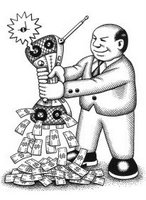« Home | Big Brassy Balls: The Colbert Blog Victory Mainstr... »
Going Private: Emmis Breaks Away From Wall Street
 Emmis Communications just announced this morning it plans to buy back all its publically-traded stock and return being a private broadcast company...becoming the largest private radio broadcasters in the country. Of course, shareholders still need to assess the plan but it looks like a good one. This is good news for radio and hopefully will start an important corrective trend for radio operators breaking the seductive grip from Wall Street.
Emmis Communications just announced this morning it plans to buy back all its publically-traded stock and return being a private broadcast company...becoming the largest private radio broadcasters in the country. Of course, shareholders still need to assess the plan but it looks like a good one. This is good news for radio and hopefully will start an important corrective trend for radio operators breaking the seductive grip from Wall Street.
Last September, Joint Communications CEO John Parikhal got trade headlines participating at the NAB radio conference speaking about the "Future of Radio" when he recommended "radio should go private again" and break away from the demands of Wall Street in order to focus on its most important need: to innovate and reinvent.
Looks like Emmis listened carefully and agreed with that view of the future.
Throughout the 1990s, "bigger is better" was the constant mantra concerning radio owners. They wanted more. More! In 1990, radio attracted about 7% of all advertising dollars spent in the U.S...a much smaller amount -- by far - than spent for ads on TV or newspapers. The false logic/augument at the time was radio needed a more consolidated voice in order to compete better with other media operations in order to command stronger shares of total advertising dollars.
As regulations eased allowing radio groups to own more and more radio stations in local markets and across the country, massive new radio broadcast companies were created, such as Clear Channel (which went from owning less than 20 stations in 1990 to 173 in 1997 to its current amount of more than 1200 radio stations. That's 9% of all commercial radio stations broadcasting in the U.S. owned by one company. While it does create a more powerful, consolidated corporate voice...and other companies also grew much larger...it didn't achieve the desired sales pitch which helped relax the ownership regulations. Some, in fact, see the radio "reforms" of the past decade a complete "folly".
Some, in fact, see the radio "reforms" of the past decade a complete "folly".
For all the effort creating these megaradio companies, total radio advertising dollars remain approximately 7-8% of all ad dollars spent on the media. In exchange, radio has focused its heavy cash-flow profits under fewer owners, become less flexible, more bureaucratic, more commercials, less independence, and somewhat more detached from local communities as radio now operates smaller workforces, utilitizes more syndication and offers less local customization.
Returning private is one way radio can become more distinctive again. What used to be the "spirit of radio" a generation ago is now found on the Internet because of its consumer-driven, grassroots appeal. Getting consumer-driven and grassroots as private radio broadcasters is a positive step in the right direction.
18 months ago, in order to combat a perception of playing too many commercials, Clear Channel implemented a "Less is More" campaign of fewer adtime every hour. Will "Less is More" also apply to radio ownership? Will we see radio more companies going private? Selloffs? Splits? Will other public radio groups follow suit? Seems likely. It would be a good thing for radio and radio listeners...and make radio more competitive against all new digital radio threats.
posted by Unknown @ Monday, May 08, 2006,
![]()
![]()















